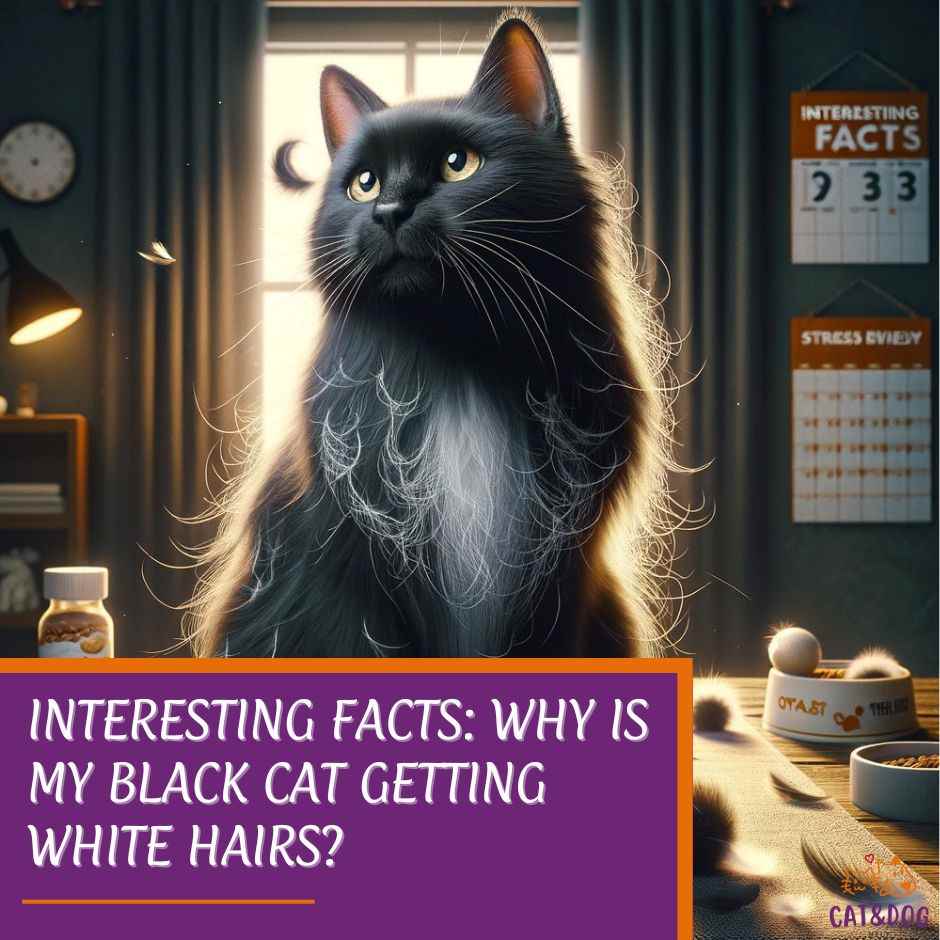Pet parents, do you ever ask yourself “Why is my black cat getting white hairs?”
If you’ve noticed a few white hairs sprouting in your black cat’s sleek coat, you might wonder why your feline friend is beginning to resemble a starry night sky. It’s quite the riddle, isn’t it?
But don’t fret—it’s not as uncommon as you’d think!
While some might instantly think health issues are at play, more often than not, it’s simply a case of genetics or the natural aging process asserting itself. (1)
But then again, lifestyle and environment can sneak in and leave their mark on your cat’s coloring. Just like us, our feline companions can show signs of stress or dietary changes in the hue of their hair.
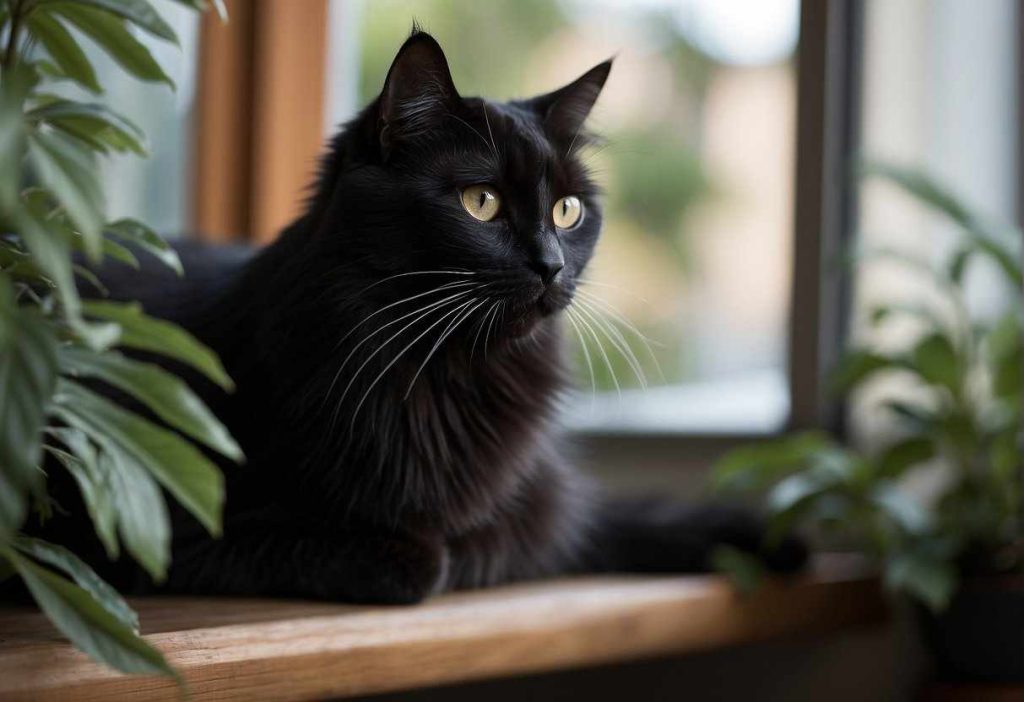
Black cats are born with a certain mystique, and part of that charm can include the unexpected appearance of little white hairs mixed in with their black fur, a natural occurrence that can add character to your feline friend, whether they are a black kitten or an elderly cat.
However, it is important to pay attention to any changes in your cat’s health or personality that may accompany the emergence of white hairs, as it could be a sign of underlying medical issues related to your cat’s health.
If you have any concerns, it is always best to consult with your cat’s vet for proper care and treatment. Just keep reading to learn more!
Key Takeaways
- White hairs in black cats can be a natural part of aging or result from genetic factors.
- Health, environment, and stress impact the appearance of white hairs in black cats.
- While usually benign, any concerning changes should be checked by a vet.
Understanding White Hairs in Black Cats
Ever looked at your sleek black cat and spotted a few rogue white hairs? You’re not alone! Black cats can develop white hairs for a few distinct reasons, and it’s generally nothing to worry about.
Let’s unravel the mystery together.
Aging and Natural Changes: Just like humans can go gray with age, black cats may also start to sport white hairs as they grow older.
This is a completely natural process where pigment-producing cells in the fur slow down.
Genetic Factors: Sometimes, that single white hair is just a hint of your cat’s hidden ancestry. Genes play a significant role, and even the blackest of cats can have a recessive gene that causes white fur to sprout up. (2)
Health Issues and Medical Conditions: Occasionally, those white specks could be a sign of a medical condition.
Skin conditions, nutritional deficiencies, or more serious health concerns might be at play, so it’s wise to consult your vet if you notice any sudden or excessive changes.
Remember, it’s not about keeping your cat’s coat perfect, but ensuring they’re healthy and happy. So next time you spot white hair, just think of it as your cat’s way of keeping life interesting!
| Cause | Description |
| Natural Aging | Common in older cats, similar to greying in humans. |
| Genetic Inheritance | Recessive genes can cause unexpected white hairs. |
| Health-Related Conditions | Always check with a vet if you’re concerned about your cat’s health. |
So, when you see your black cat turning into a speckled night sky, take a moment to appreciate the unique beauty and remember, that a few white hairs are often just part of the ride.
Medical Insights: Why is My Black Cat Getting White Hairs
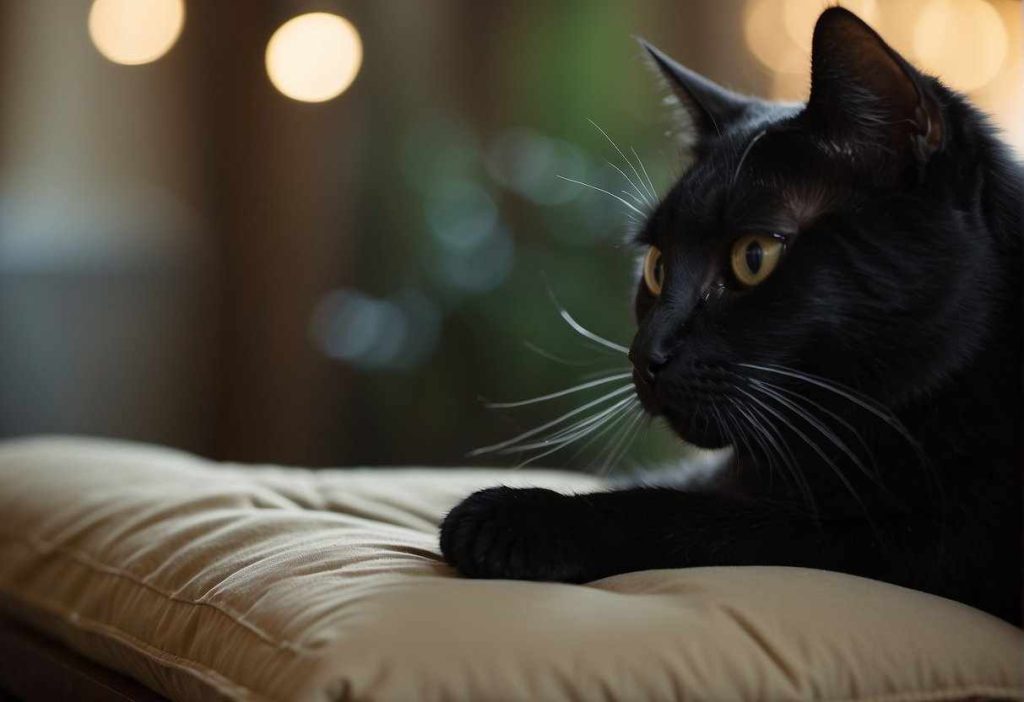
Health Conditions Linked to White Hairs
Occasionally, white hairs on your black cat might hint at medical disorders:
- Nutritional Deficiencies: Just like you, your cat needs a balanced diet rich in essential nutrients. A deficiency might manifest through changes in fur color.
- Hormonal Imbalances: Cats have a delicate hormonal balance, and any disruption might cause fur discoloration.
Skin and Fur Diseases
Pay attention to other changes in your cat’s coat. Could there be any flakiness or a change in texture? Sometimes skin conditions or infections can result in lighter hairs.
When to Consult a Veterinarian
You’re the best judge of your cat’s typical behavior and appearance. If you notice unusual white hairs coupled with behavior change, it’s time for a vet visit.
Identifying Alarming Symptoms:
- Loss of appetite
- Lethargy
- Visible skin lesions
Remember, early detection could make all the difference!
Importance of Regular Check-ups
Schedule regular check-ups for your cat. Your vet can keep an eye on any concerning developments, ensuring that your furry friend stays healthy for years to come. Here’s what regular check-ups can offer:
- Preventive care: Catching issues early
- Peace of mind: Knowing your cat is healthy
So, while a few white hairs may not always be cause for alarm, staying informed and proactive about your cat’s health goes a long way.
Similarly, observing cat whisker color changes can provide insights into your pet’s health and aging process, just as the appearance of white hairs in their coat does.
Keep an eye out, and your black cat will continue gracefully strutting with just the right amount of white hair!
Practical Care and Maintenance
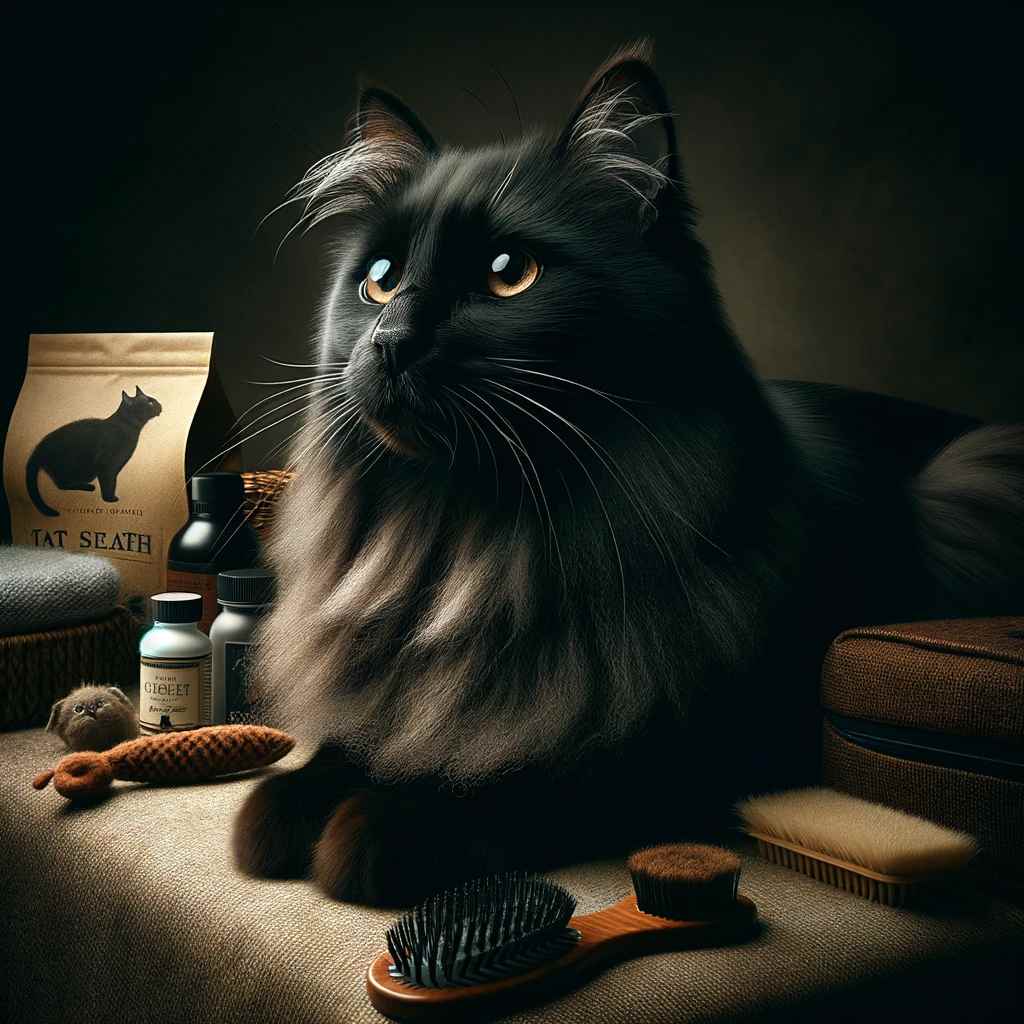
Have you noticed a few white hairs sprouting on your black cat’s coat? It’s time to dive into some practical care and maintenance to keep your furry friend’s fur as luscious and dark as possible.
Let’s tick off some essentials, shall we?
Daily Grooming Techniques
- Brushing: Get into the rhythm of daily brushing. It helps to distribute natural oils evenly throughout your cat’s fur, keeping it shiny and less prone to getting white hair.
- Touch-ups: Spot-clean your cat’s fur with a damp cloth. This little hack can prevent dirt buildup that might make the fur look lighter.
Effective Grooming Practices
- Start with gentle strokes to make sure your cat feels at ease.
- Use a de-shedding tool during the high-shedding seasons to remove dead hair.
- Always move in the direction of hair growth to prevent any discomfort.
Choosing the Right Grooming Tools
- Opt for a slicker brush or a fine-toothed comb for daily grooming.
- A grooming mitt can be a friendly option for cats who startle easily.
Dietary Recommendations for Healthy Fur
What goes into your cat, shows on their fur:
- Protein-rich meals: Ensure their diet is full of high-quality protein. (3)
- Fatty acids: Omega-3 and Omega-6 are your cat’s best friends for a vibrant coat.
Nutritional Needs
Ensure your cat’s diet is balanced. You can chat with your vet about this to tailor nutrition to your cat’s age and health.
Supplements and Vitamins
- Biotin and Vitamin E supplements can sometimes assist in maintaining healthy fur.
- Adding a little flaxseed oil to their diet can introduce those essential fatty acids we talked about.
Remember to cater to the individual needs of your cat. Feeling overwhelmed? Your vet is only a call away, ready to guide you to the best choices for your feline’s coat care.
Keep it simple, maintain consistency, and your black cat will continue to charm with their sleek, dark coat.
In-Depth Scientific Insights
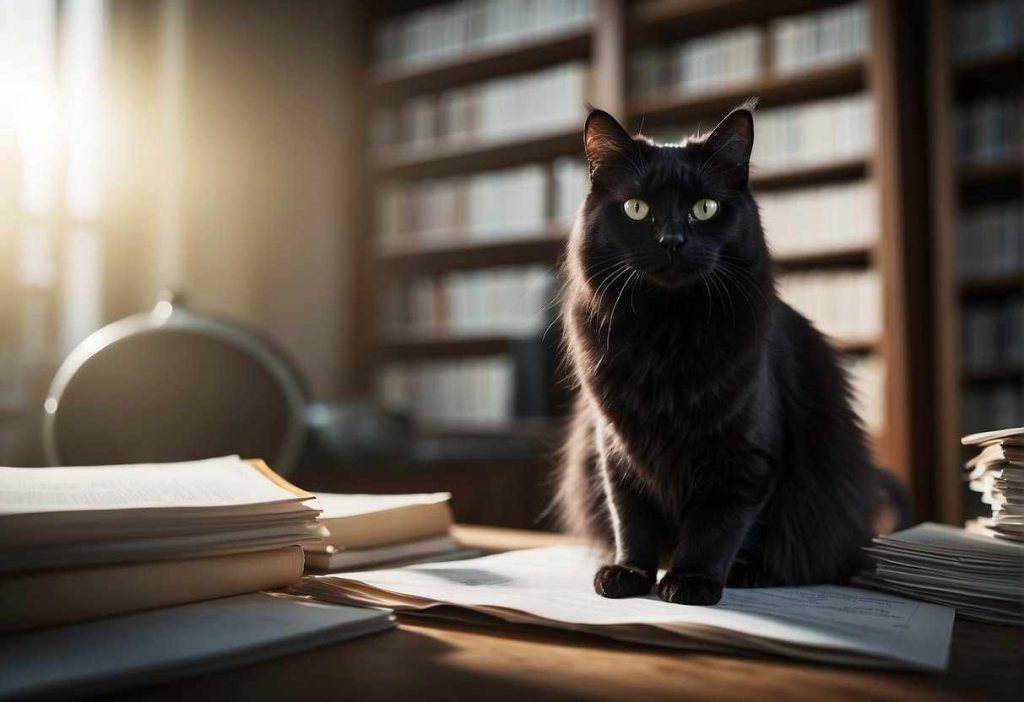
What’s going on beneath the fur? It’s a mix of biology and a dash of genetics that weaves the colorful tale of your feline’s coat. (4)
Biological Processes Behind Fur Color Changes
Imagine your cat’s fur as a canvas where melanocytes, the pigment-producing cells, are the artists. Over time, these little artists might slow down, creating a sprinkling of white among the black.
It’s not just about age; stress can play a role too. Think of it like those stories where someone’s hair turns white overnight from fright—only in slow motion for your adult cats.
This process of graying is a normal part of the aging process for cats and is caused by a decrease in melanocytes.
- Genetics of Pigmentation
Tucked within your cat’s DNA are secrets to their fur colors. A gene called MC1R is the mastermind behind the eumelanin pigment, which typically gives the black or brown hues. (5)
Any variations, or genetic mutations, can mean a surprise white hair here and there. (6)
It’s as if someone gently dabbed a paintbrush with a different color on their otherwise monochromatic masterpiece, due to the production of melanin.
- Biochemical Factors
Your cat’s body is like a tiny factory, producing hormones and other substances that affect fur color. Cortisol, a stress hormone, might be the culprit influencing the coat’s color palette to shift.
If your cat is feeling like it’s in a constant state of “cat-astrophe,” those white hairs might be a sign to take a paw and relax due to a variety of reasons, including hormonal changes and imbalances in hormone levels affecting the hair follicles.
As the cat matures, the number of white hairs caused by depigmentation disorders, such as vitiligo or leukoderma, may increase, leading to a change in the black cat’s fur color. (7)
This makes it important to monitor the number of white hairs on your cat’s coat as they age.
With a higher number of white hairs, it may be an indication of underlying health issues that should be addressed by a veterinarian.
So next time you spot white hair on your black cat, you know there’s a whole world of science playing out in their fur! It’s not just about looks; it’s a telling sign of their inner workings.
Keep a watchful eye on your kitty; their coat can give you clues about their well-being. And as you do, admire the unique, living artwork they carry with them every day.
Environmental and Lifestyle Influences
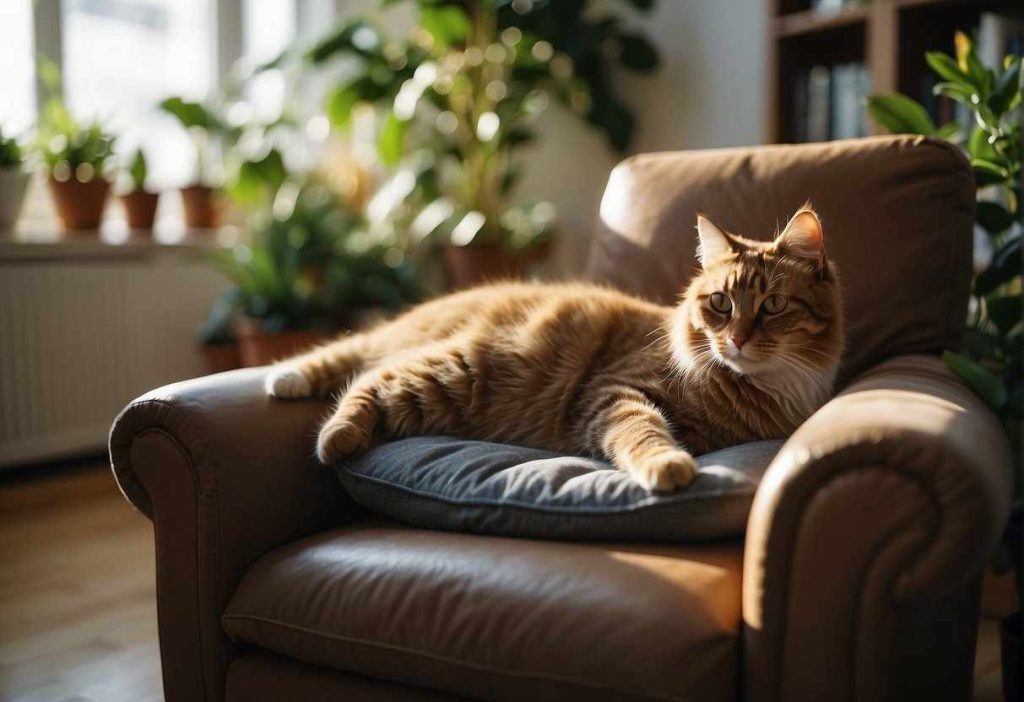
Impact of Diet and Nutrition Let’s peek into what your black cat is munching on. If they’re not getting the right mix of nutrients, you might see a change in coat color. A balanced diet is key:
- Proteins: Essential for hair pigmentation.
- Vitamins: B vitamins support healthy skin and hair.
- Minerals: Iron and zinc are particularly vital.
Are you ensuring your pal’s plate is packed with these nutrients?
Role of Stress and Environmental Factors Ever notice how stress can turn human hair gray? Cats aren’t immune to this:
- Stress: Can cause color loss due to halted pigment production.
- Sunshine: Just like it bleaches our hair, the sun can lighten your cat’s coat too!
It isn’t just about what’s in their bowl or how much they’re sunbathing, though. The world inside and around your home plays a part too. Things like:
- Air Quality: Pollutants can affect skin and fur health.
- Changes: New pet or move? These can crank up the stress dial.
Remember, a happy cat equals a healthier, more consistent coat. So, have you given your cat’s lifestyle a thought today?
Expert Opinions and Veterinary Insights
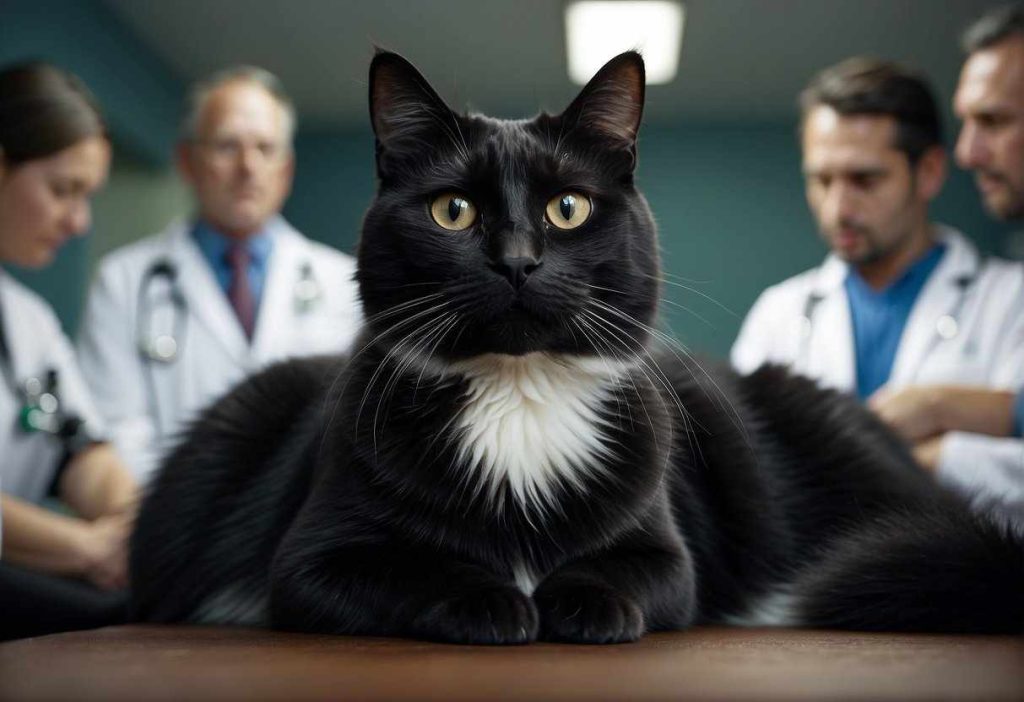
Here’s what some veterinarians and cat experts have to say about this furry phenomenon.
- Genetics: Sometimes, it’s all in the genes. Your cat might have a genetic predisposition for sporting a few white hairs. Most of the time, it’s normal, just like a human getting a grey hair or two.
- Aging: Just like us, cats can go grey with age. It’s a sign of your cat’s life experience, a badge of honor if you will.
- Health Check: Keep an eye on your cat’s overall health. In some cases, the presence of white hairs could hint at a deficiency or medical condition that might need attention.
- Stress: Yes, cats can stress out too! A tough day of lounging and bird-watching could lead to increased cortisol, possibly changing their fur color.
Here’s a quick checklist to keep tabs on:
- Overall health: Any sudden weight loss or gain?
- Behavior changes: Is your cat still the reigning couch champion?
- Skin examination: Any irritation or changes in the skin?
And remember, if you’re ever unsure, a quick trip to your friendly vet can put your mind at ease. They’re the pros with all the answers to your feline quandaries.
But most likely, your black cat’s white hairs are just a normal part of their charming appearance.
Genetic Specifics and Rare Cases
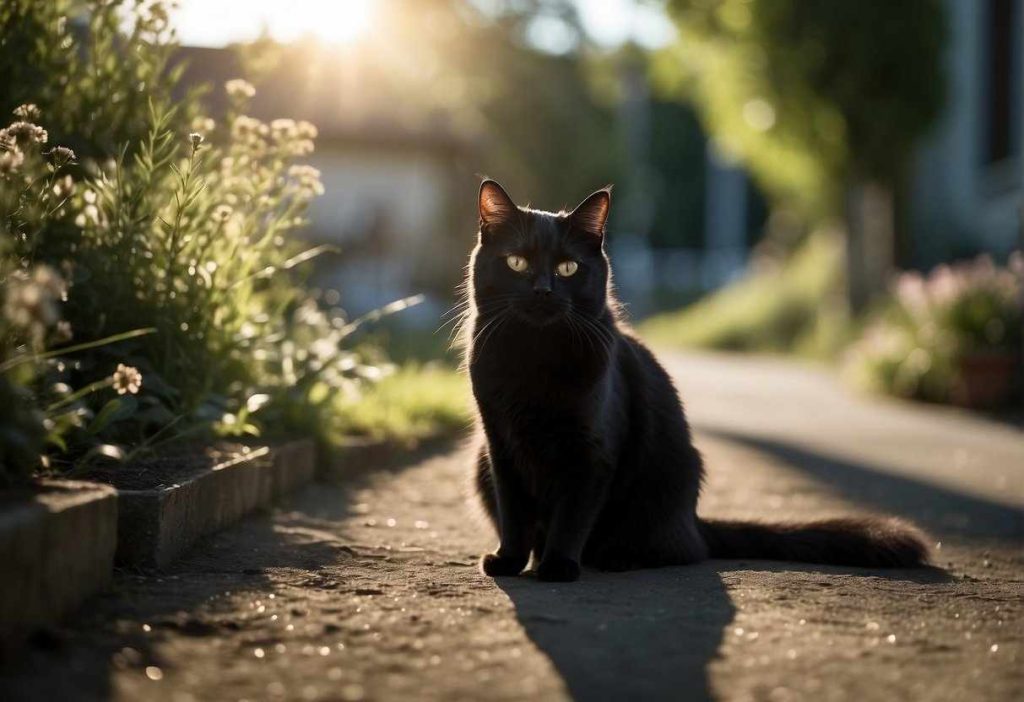
Breed-Specific Genetic Traits:
- Certain breeds are prone to developing white hairs. It’s like a hidden signature in their DNA that pops up unexpectedly!
- A gene called ‘white spotting’ might be the culprit. It’s like a little artist adding splashes of white to your cat’s fur canvas.
Understanding Rare and Exceptional Cases:
- Imagine a gene just lying in wait, then bam!, it decides to express itself as your cat ages.
- Random occurrences of white hairs could be just a tiny genetic quirk, like your cat’s own unique barcode.
Think of it as your furry friend being decked out in nature’s special edition costume!
When Can You Expect These Changes? No cat reads the genetic rulebook, so these changes can be quite spontaneous. No two cats are the same after all!
Remember, these genetic surprises are rarely a cause for concern. Your cat’s uniqueness is part of their charm! But if you’re ever unsure, a chat with your vet can put your mind at ease.
Your cat may just be one of those rare felines sporting a dash of unexpected mystique!
Comparative Analysis with Other Breeds
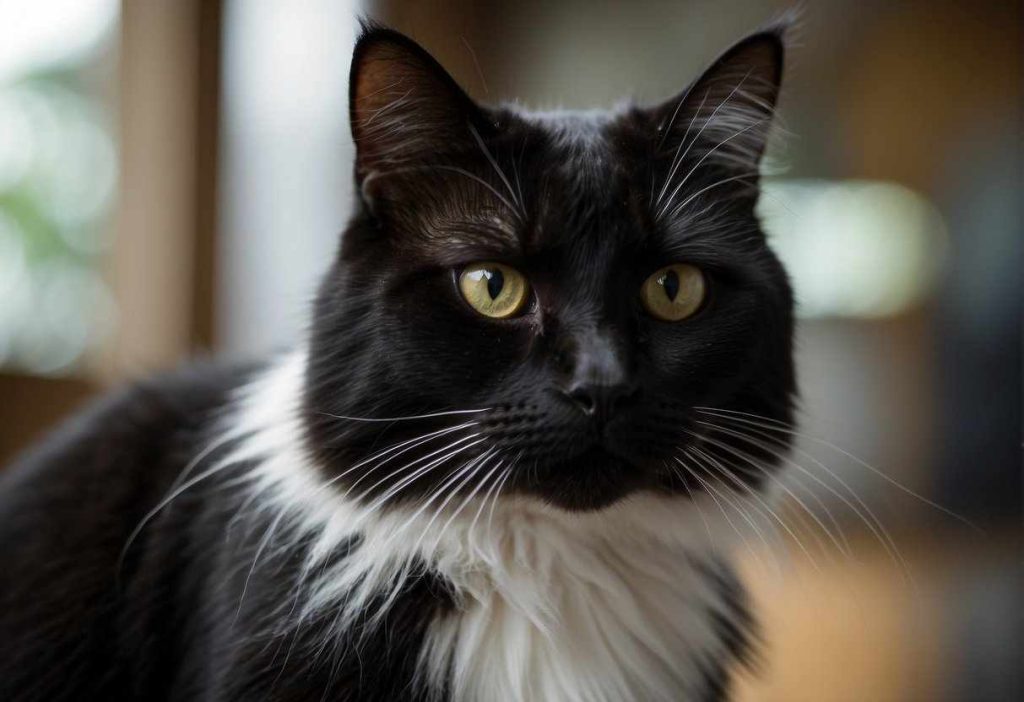
Let’s take a whimsical wander through the world of cats to see how your black furball, with its unique black cat coat, compares with their feline friends when it comes to sudden changes in their fur.
While black cats are known for their shiny, lustrous coats, they may also experience changes in their fur just like any other breed.
To maintain your black cat’s healthy and beautiful coat, it’s essential to take a proactive approach and properly care for your black cat’s coat.
Here are some tips to help you keep your black cat’s coat looking its best, including regular brushing and grooming to prevent matting and maintain the natural oils in their black cat’s coat.
Regular grooming also helps to remove any loose or white hairs, keeping your black cat’s coat looking sleek and uniform.
Similarities Across the Board Cats of various breeds can experience changes in fur color due to several common factors:
- Aging: Just like humans might get a peppering of grey, older cats can also develop white or lighter hairs.
- Stress: A highly stressed cat could show a change in fur color, similar to human hair graying prematurely under stress.
Unique Breed Traits, However, some traits are breed-specific, making your black cat’s experience a bit different:
- Genetic Markings: Breeds like the Egyptian Mau may naturally have spotted fur, while your black cat’s unexpected white hairs aren’t part of their breed standard.
- Coat Patterns: Siamese and other colorpoint breeds change color based on temperature, which is not the case for the typical black domestic shorthair or longhair.
In Pixels and Points: General vs. Unique Changes
| Trait | General Change | Black Cat Specific |
| Aging | Common across breeds | White hairs more noticeable |
| Stress | Possible in all breeds | May cause stark white hairs |
| Genetic Mutations | Uncommon, varies by breed | White hairs can be a mutation |
Why is this happening? It’s usually a perfectly natural process, but if you’re ever in doubt, a vet can give you peace of mind.
Remember, each cat is as unique as their human! Got a cool snapshot of your black cat rocking those new white hairs? They’re celebrating their unique style—and that’s just purr-fect!
Psychological Impact on Owners
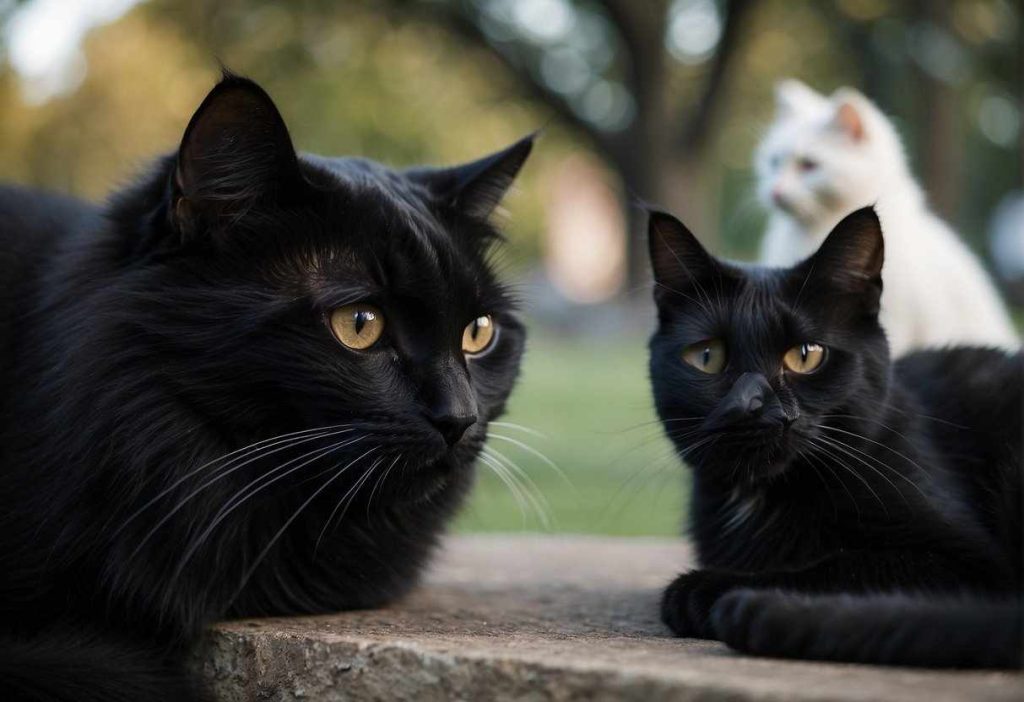
When your sleek black kitty starts sporting white hairs, it’s more than just a change in appearance—it can tug at your heartstrings. Cats are part of the family, after all!
Coping with Aging and Changes in Pets:
- It’s completely understandable to feel a bit concerned or nostalgic. Your feline friend is growing older, and you’re reminded that time with our pets is precious.
- Witnessing these changes might even worry you. Is this normal, or is something else at play?
Emotional Support and Understanding:
- Take comfort in knowing that aging is a natural process, and a few white hairs are generally nothing to fret about.
- Talk to other cat owners! Sharing experiences can provide reassurance.
But here’s the kicker: changes in your cat’s coat color, like those random white hairs, can also be due to factors like stress or diet.
So keep an eye peeled for other out-of-the-ordinary behaviors and consult your vet if something seems off.
Remember:
- Stress, genetics, and diet could contribute to changes in coat color.
- Aging is the most common and natural cause.
No drastic changes suddenly, though, right? If it’s a slow transition, it’s usually just your cat moving gracefully into their golden years. Embrace it! They’re the same loving bundle of fur with a dash of wisdom sprinkled in.
In the meantime, keep sharing those purrs and cuddles. Your emotional bond tends to make everything better—for you and your spirited companion.
Make the most of your moments together, no matter the color of their beautiful fur!
Quick Recap
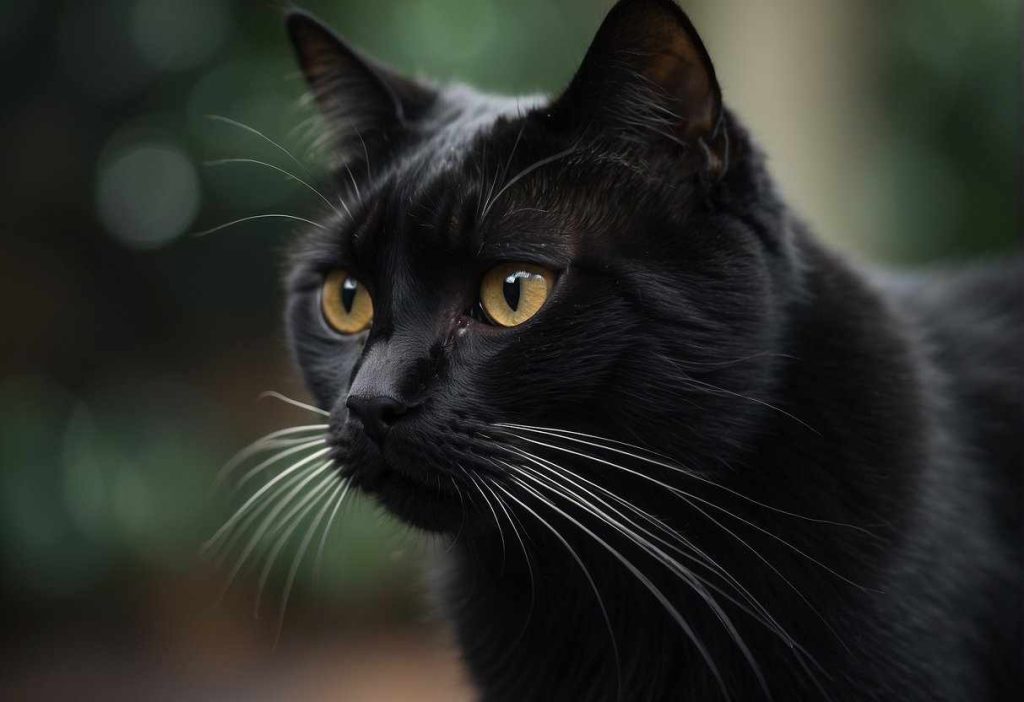
Let’s quickly break down why your feline friend might be sprouting these unexpected strands:
- Aging: Just like us, cats can go grey with age. Less melanin means more white hairs.
- Genetics: Sometimes, it’s simply in the genes, and black cats may be predisposed to grow a few white hairs.
- Health: Though it’s less common, health issues can also cause color changes, so keep an eye out for other symptoms.
- Stress: Cats under stress might show it in their coat, so consider if there have been any recent changes in your home environment.
What to Do?
- Check for other signs of health issues.
- Ensure your cat has a stress-free environment.
- Keep them well-hydrated with plenty of water.
Remember, a few white hairs usually aren’t a cause for concern, but if you’re ever in doubt, a vet visit can give you peace of mind.
Keep it Positive
Caring for your cat’s coat isn’t just about vanity—it could be a window into their well-being. Keep showering them with love and attention!
Frequently Asked Questions
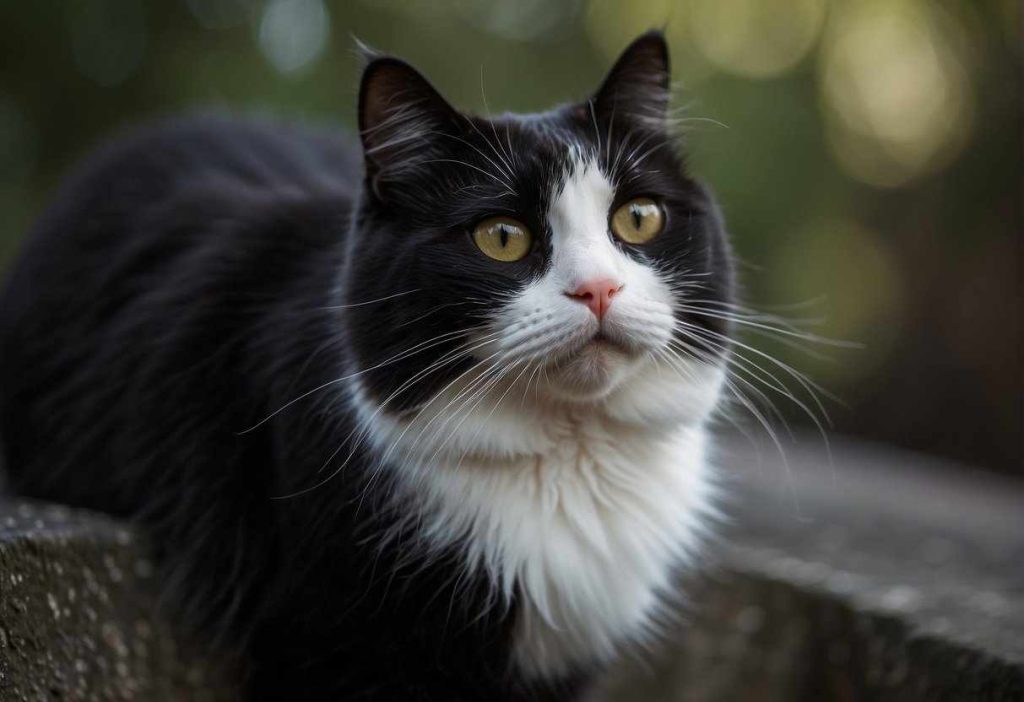
Noticing white hairs sprinkling through your black cat’s sleek coat? Let’s get to the bottom of this fluffy mystery together.
From age-related changes to, possibly, health signals, these FAQs will unravel some of those questions playing tag in your mind.
Why is my black cat developing white hair as it ages?
Just like humans find a silver strand or two with age, your black cat may also begin to sport white hairs.
It’s a natural part of aging, where pigment-producing cells slow down over time.
Could the white hairs on my black cat indicate a health issue?
While occasional white hair is usually harmless, a sudden increase could be your cue to scrutinize for other symptoms that might suggest an underlying issue.
What specific medical conditions might cause white hair in black cats?
Conditions like vitiligo or hormonal imbalances may lead to depigmentation, and in rarer cases, issues with the spinal cord or nerves might be the culprits behind those white hairs.
How can I tell if the white hairs on my black cat are a sign of illness?
Keep an eye on your feline friend for other changes like weight loss, lethargy, or changes in appetite alongside the white hairs. If your cat seems off, a vet visit is due.
Are there any genetic reasons for my black cat to develop white hair?
Genetics might have written a sneaky clause in your cat’s fur color code. Some black cats have a hidden gene that gives them the salt-and-pepper look over time.
How should I adjust my black cat’s diet if it’s developing white hair?
While there’s no special diet for white-haired growth, ensuring your cat is getting all the necessary nutrients helps maintain overall fur health and luster.
Can environmental factors like stress or sunlight exposure cause white hairs in black cats?
High stress can cause your cat’s hair to lose color, and while sunlight doesn’t create white hairs, it can lighten dark fur, giving the appearance of white hairs.
Scan your kitty for any other out-of-the-ordinary occurrences, and always err on the side of caution – that’s how you keep those nine lives long and happy!
- How to Perform at an Online Casino - July 7, 2025
- Free Slots With Bonus and Free Spins - July 6, 2025

